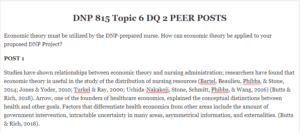DNP 815 Topic 6 DQ 2 PEER POSTS
DNP 815 Topic 6 DQ 2 PEER POSTS
Economic theory must be utilized by the DNP-prepared nurse. How can economic theory be applied to your proposed DNP Project?
Also Read: DNP 815 Topic 6 DQ 1 PEER POSTS
POST 1
Studies have shown relationships between economic theory and nursing administration; researchers have found that economic theory is useful in the study of the distribution of nursing resources (Bartel, Beaulieu, Phibbs, & Stone, 2014; Jones & Yoder, 2010; Turkel & Ray, 2000; Uchida-Nakakoji, Stone, Schmitt, Phibbs, & Wang, 2016) (Butts & Rich, 2018). Arrow, one of the founders of healthcare economics, explained the conceptual distinctions between health and other goals. Factors that differentiate health economics from other areas include the amount of government intervention, intractable uncertainty in many areas, asymmetrical information, and externalities. (Butts & Rich, 2018).
DNP-prepared nurses in select areas may have to use clinical applications of some of the assumptions of classical economic theory in the form of social exchange theory. An example is the study of provider interactions with patients and their attitudes to risk (Roth, Trautman, & Voskort, 2016) (Butts & Rich, 2018). The process of using economic theory with the DPI project is awareness of the cost of end-stage renal disease and potentially how the implementation of the DPI project will help control cost while improving the quality of care for the member.

DNP 815 Topic 6 DQ 2 PEER POSTS
Overall, Medicare costs for people with CKD were $87.2 billion in 2019, or $24,453 per Medicare beneficiary older than 65 years. (CDC, 2022). Medicare fee-for-service spending, including medication for patients with ESRD or kidney failure, reached over$37billion in 2019 ($86,400 for each person). Nearly 7% account for Medicare-paid claims costs. (CDC, 2022).
Studies have shown one way to ease the cost of ESRD is by using Multidisciplinary care programs (MDC). MDC comprises nephrologists, advanced practitioners, educators, dieticians, and social workers. (Ozieh et al., 2017). Patients have visits with the MDC team more frequently the more severe the disease becomes. (Ozieh, 2017). The DPI project will focus on identified gaps in care for patients diagnosed with ESRD who have missed dialysis resulting in an inpatient stay. Dedicated care management has been shown to support interventions of the problem through a care management pathway collaboration that would improve patients with ESRD to self-manage and avoid overutilization of health systems. (Rainey et al., 2020). Implementing dedicated care management will improve the quality of life for patients by providing information that can be utilized to address symptoms or access care before symptoms become unmanageable.
POST 2
Economic theory is concerned with choice and the assumption is made that choices are made after the consumer has been provided with full information. However, individuals who present within the healthcare sector are frequently unwilling or unable to collect the information required to make this choice. Health economics is used to promote healthy lifestyles and positive health outcomes through the study of health care providers, hospitals and clinics, managed care, and public health promotion activities. Health economists apply the theories of production, efficiency, disparities, competition, and regulation to better inform the public and private sector on the most efficient, cost-effective, and equitable course of action. Such research can include the economic evaluation of new technologies, as well as the study of appropriate prices, anti-trust policy, optimal public and private investment, and strategic behavior (Williams IP, Bryan S, 2017).
The continued growth in the economic evaluation of healthcare over the past years has led to a shortage of trained health economists globally, leading to several universities and/or national governments developing specialized health economics programs to train more health economists. One of the common problems with many of these training programs is that they only educate new health economists to the master’s level, and as such they are unable to cover the many skills needed by a successful health economist. It is important that those individuals who are involved in the provision and purchase of healthcare fully understand the background to this concept and understand some of the terms which are commonly used ( Shiell A, Hawe P, Gold L, 2018).
Without good economic analysis, healthcare is unlikely to progress and only by undertaking systematic reviews is it possible to identify alternatives to existing or new programs. Such evaluation is dependent on the quality of underlying medical evidence, and, because of this, clinical trials are now viewed as a natural vehicle for economic analysis. Health Economics is an applied field of study that allows for the systematic and rigorous examination of the problems faced in promoting health for all. By applying economic theories of consumer, producer and social choice, health economics aims to understand the behavior of individuals, health care providers, public and private organizations, and governments in decision-making (Eddama O, Coast J. A 2018).

